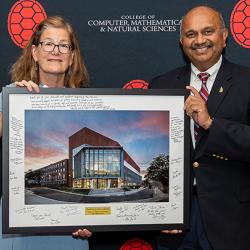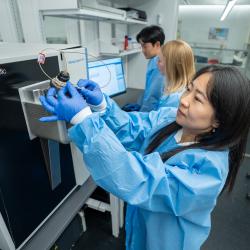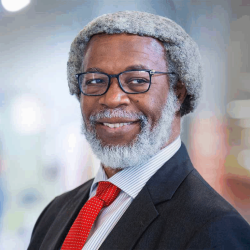UMD Physics and Chemistry Graduate Students Awarded ARCS Scholarships
Zachary Eldredge and Matthew Thum will each receive $15,000
The Achievement Rewards for College Scientists (ARCS) Foundation awarded two students from the University of Maryland’s College of Computer, Mathematical, and Natural Sciences with $15,000 scholarships for the 2018-2019 school year. This year’s scholars are physics graduate student Zachary Eldredge and chemistry graduate student Matthew Thum.
Eldredge’s goal is to help build a quantum computer that can attack problems impossible for classical computers to solve. Since arriving at UMD in 2014, Eldredge co-authored five publications, including two first-author papers published in the journals Physical Review A and Physical Review Letters.
“I’m proud to say that two of Zach’s papers are the highlights of my own research over the past three years,” said Alexey Gorshkov, Eldredge’s advisor who is an adjunct assistant professor in the Department of Physics and a physicist at the National Institute of Standards and Technology. “In fact, these two papers are so promising that we filed patents for the corresponding ideas, all having to do with the harnessing of the peculiarities of quantum mechanics for technologies such as powerful computing, secure communication and superior sensing.”
One of Eldredge’s current projects examines the use of quantum mechanics to improve measurements, especially on particles that show quantum behavior. Examples include the atoms in biological molecules such as proteins.
“If you need to know the difference in some quantity between two points, a common method is to measure the quantity at each point and then subtract,” Eldredge explained. “Instead, we are developing methods to measure the difference directly. Our methods would be more accurate because we are only measuring once, not twice.”
In addition to the time he spends in the lab, Eldredge also volunteers around campus and in the community. He was recently elected as a Graduate Student Government representative for the Department of Physics.
“Not only is Zach an excellent physicist, he is also an excellent citizen of the department,” said Steve Rolston, professor and chair of the Department of Physics. “He was one of the most active members of our self-organized graduate student committee, which strives to make graduate school as positive an experience as possible.”
Eldredge also participates in public outreach activities, such as the American Physical Society’s Congressional Visits Day, the USA Engineering & Science Festival and UMD’s Maryland Day.
“I think we have a duty as publicly funded scientists at a major public university to reach out and talk to people because this knowledge belongs to everyone,” said Eldredge, who displayed floating magnets and superconducting materials at Maryland Day last month. “When we discover amazing things, it is on us to communicate it to the public.”
After completing his Ph.D., Eldredge would like to work in quantum computing technology development or policy.
“I’m interested in doing something that really allows me to take the research I’ve done here and see how it unfolds in the real world,” Eldredge said.
Before receiving his first ARCS scholarship in 2017, Eldredge received a Joint Quantum Institute graduate fellowship in 2014 and an Outstanding Graduate Assistant Award from the UMD Graduate School in 2016.
“The ARCS scholarship is a huge honor,” said Eldredge. “On top of the financial support, the award gives me the opportunity to meet people at ARCS events and to show my work to those who might not see it otherwise.”
Matthew Thum
 Thum studies photochemistry, or reactions triggered by light. In particular, he searches for better ways to use photochemistry to make polymers.
Thum studies photochemistry, or reactions triggered by light. In particular, he searches for better ways to use photochemistry to make polymers.
“I fell in love with photochemistry because light is everywhere, it’s cheap and it has so many applications,” said Thum, who arrived at UMD in 2014. “I got interested in studying polymers because they are everywhere, from laptop cases to teeth fillings.”
Thum currently focuses on a group of methods that make it possible to dissolve and rebuild polymers. These methods—called reversible addition-fragmentation chain transfer (RAFT) polymerization—are useful in manufacturing specialized polymers such as biomaterials.
His most recent paper—a first-author publication in The Journal of Physical Chemistry A—demonstrates a novel method of using two different photons of light to release a molecule. Thum hopes to apply this method toward controlling RAFT polymerization in the future. Because most light-based polymerization methods use only one color of light, this method would increase the degree of precision possible in polymer manufacturing. Applications for such a method include high-resolution imaging and optical data storage.
“Matt has been extremely productive in research,” said Amy Mullin, professor and director of the graduate program in chemistry and biochemistry. “He is at the very top among an elite group of young scientific leaders.”
Thum experienced financial need as an undergraduate student. To help pay his tuition at the University of Delaware, he worked part time at Riverside Specialty Chemicals Inc. during his junior and senior years.
“Working in industry was a great experience and I learned a lot about real-world applications of chemistry,” Thum said. “But I didn’t get research experience in that position, so I didn’t get into grad school at that time.”
Undeterred, Thum continued to work at Riverside Specialty Chemicals, researching vanadium-based rechargeable batteries, for two years before applying to graduate programs again. This time, UMD’s graduate program in chemistry and biochemistry accepted him.
Once on campus, Thum impressed Chemistry and Biochemistry Professor Daniel Falvey, who recruited Thum to his research group.
“Matt has the intellectual curiosity and critical thinking skills that I find impossible to train into students but are crucial to success at the highest levels,” Falvey said.
As a graduate student, Thum continued to experience financial need, but received assistance from the Department of Chemistry and Biochemistry through a Graduate Assistance in Areas of National Need Fellowship and the Gary and Sue Christian Endowed Graduate Award.
“Awards, even small ones, make all the difference in the world to a graduate student,” Thum said. “They helped me get a laptop, go to a conference, pay rent and generally get by.”
Thum expressed similar gratitude for the ARCS scholarship.
“The fact that someone out there—who has never met me—is willing to invest in me as a scientist is the biggest vote of confidence I could ever receive,” Thum said. “It’s about much more than the money; it’s an honor.”
Thum pays it forward by helping other students facing barriers of their own. As co-president of UMD’s chapter of the Alliance for Diversity in Science and Engineering (ADSE), Thum helped organized a conference for over 100 young scientists from groups underrepresented in the sciences at UMD in fall 2017.
“I really appreciate ADSE because it educates people about the importance of diversity,” said Thum, who remains a member of ADSE. “Yes, there are barriers for many people, but supporting diversity—just saying that it’s possible for anyone to become a scientist—is very important.”
###
Media Relations Contact: Irene Ying, 301-405-5204, zying@umd.edu
University of Maryland
College of Computer, Mathematical, and Natural Sciences
2300 Symons Hall
College Park, MD 20742
www.cmns.umd.edu
@UMDscience
About the College of Computer, Mathematical, and Natural Sciences
The College of Computer, Mathematical, and Natural Sciences at the University of Maryland educates more than 9,000 future scientific leaders in its undergraduate and graduate programs each year. The college’s 10 departments and more than a dozen interdisciplinary research centers foster scientific discovery with annual sponsored research funding exceeding $175 million.








